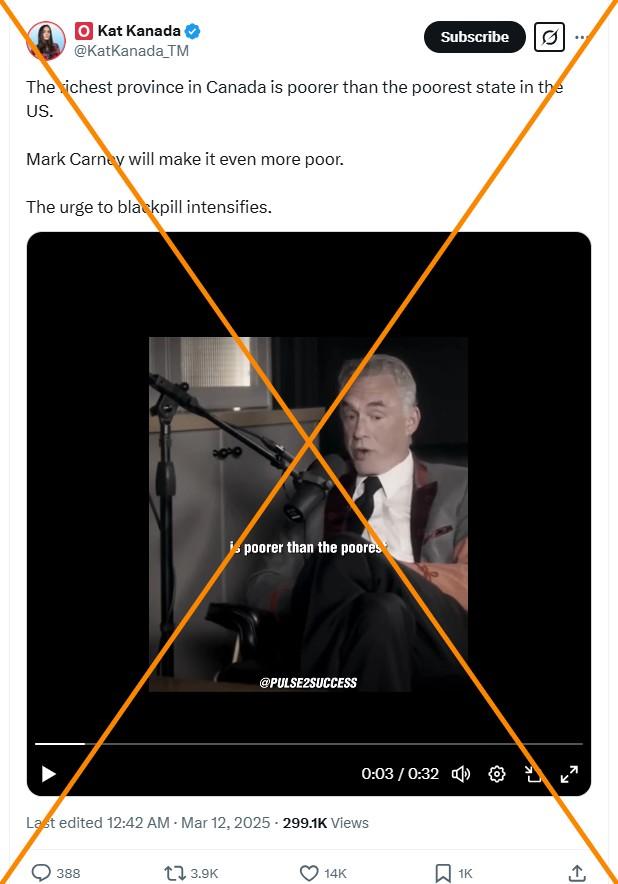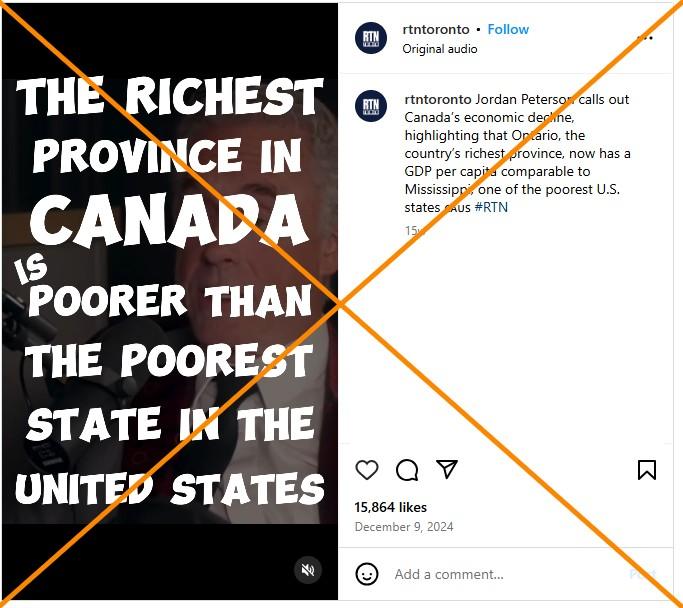
Canada's richest province is not 'poorer than poorest' US state
- Published on March 25, 2025 at 21:14
- 5 min read
- By Gwen Roley, AFP Canada
"The richest province in Canada is poorer than the poorest state in the United States," claims Canadian celebrity psychologist Jordan Peterson in a video posted to X on March 12, 2025.
Various posts using the video clip of Peterson -- whose outspoken views on social and political issues have frequently included misinformation -- spread around the same time on Facebook and Instagram.


A keyword search reveals that Peterson first made the claim in a December 6, 2024 episode of his daughter Mikhaila Peterson's podcast. He repeated similar assertions about the relative decline of the Canadian economy in a January 2, 2025 interview (archived here) with Conservative Party of Canada Leader Pierre Poilievre.
Since the psychologist's conversation with the country's opposition leader, interest has grown in the relative strength of Canada's economy compared to the United States, particularly as President Donald Trump has justified tariffs on Canadian goods by inaccurately asserting his country subsidizes his northern neighbor. Trump has gone on to suggest that Canada should become the 51st state due to the potential economic benefits and lower taxes for Canadians (archived here).
After former central banker Mark Carney took office as prime minister in March, many posts hinted the new Liberal leader could make Canada poorer as the country heads into a snap election -- now scheduled for April 28.
In the clips, Peterson implies he based the claims on GDP per capita (archived here), a measurement of output within a jurisdiction divided by its population, commonly used for international comparisons of relative economic strength and living standards.
Reports on stalled growth in Canada's economy compared to the United States are not uncommon, with one analysis putting the GDP per capita of the whole country behind most US states. According to the World Bank, Canada's GDP per capita in 2023 was $53,431, while in the United States, it was $82,769 (archived here).
University of Calgary professor Trevor Tombe (archived here) wrote in September 2024 that the economic gap between the two countries had reached a new record.
The gap between the Canadian and American economies has now reached its widest point in nearly a century.
— Trevor Tombe (@trevortombe) September 5, 2024
My latest for @TheHubCanada here: https://t.co/ZrUr6KFMPC#cdnecon#cdnpolipic.twitter.com/zBeZpuwVWP
However, the economist disputed the claim that all Canadian provinces were poorer than all US states.
"It is incorrect to say that Canada's richest province is poorer than the poorest state in the US," Tombe said in a March 13, 2025 email to AFP.
He said by his calculations, Alberta was the richest province in Canada in 2023 (the most recent year data was available for all jurisdictions) with an adjusted GDP per capita of $82,200, while that of the poorest US state of Mississippi was $49,800.
Purchasing power parity
International bodies use so-called "purchasing power parity" (PPP) to adjust countries' GDP data for comparison, by taking into account the cost of goods and services (archived here).
Using the Organization for Economic Cooperation and Development (OECD) PPP for Canada with data from Statistics Canada, the US Bureau of Economic Analysis and Census Bureau (archived here, here, here, here, and here), AFP calculated the GDP per capita of each US state and Canadian province for 2023 and produced similar results to Tombe's.
With adjusted per capita GDP, both Alberta and Saskatchewan were wealthier than half of US states, while Prince Edward Island, Nova Scotia and New Brunswick ranked poorer than every jurisdiction in the list. Quebec and Manitoba also ranked among the 10 poorest observed regions.
Tom Kemeny, an associate professor at the Munk School of Global Affairs and Public Policy at the University of Toronto (archived here), looked at the same public data, and found similar results, contradicting the claim that all US states were wealthier than Canadian provinces.
He said organizations use PPP to calculate comparable per capita GDPs since costs and standards of living vary from location, pointing out that someone in Canada could have less money than an American counterpart but spend less on items including healthcare or education, which can be more expensive in the United States.
"For all Americans, there are costs that are built-in that Canadians don't have," he said in a March 18, 2025 interview.
Kemeny said Alberta and Saskatchewan are wealthier by this metric than the economic powerhouse of Ontario, which has a higher nominal GDP, because they are major producers of resources such as natural gas while not having as high a population.
Canada's economy slows
Mark Manger, a Munk School professor (archived here), said the Canadian economy had stalled with comparatively slow GDP growth relative to its booming population.
"The US is just more productive per hour," he said on March 18. "Productivity growth in Canada has been very, very poor over the last decade."
Another economic metric, median earnings per person, does indeed show every Canadian province behind every US state, according to a study by the Fraser Institute in 2022 (archived here), although many economists maintain that per capita GDP is a better measure of living standards.
Some argue that focusing on income and earnings can help highlight wealth inequality. However, both Tombe and Kemeny posited it is not a perfect way to compare jurisdictions, again due to varying costs of living.
Alex Whalen, one of the Fraser Institute paper's authors and its Atlantic Canada prosperity director (archived here), said the think tank chose to track earnings because it would be more relevant to the average person. He also said that Canadians are typically taxed more than Americans which could push down the take-home income for residents of the northern country.
Whalen acknowledged in a March 18 interview that there are various ways to measure economic prosperity that "may not find the exact same result because there are different components to those measures."
Nonetheless, he argued that the trends in Canada were worrisome because of weaker growth in recent years: "There's a key story there in terms of how much things have changed."
Read more of AFP's reporting on misinformation in Canada here.
Copyright © AFP 2017-2026. Any commercial use of this content requires a subscription. Click here to find out more.
Is there content that you would like AFP to fact-check? Get in touch.
Contact us
